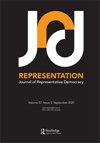表征理论的情感转向——以Indination为例
Q2 Social Sciences
引用次数: 0
摘要
摘要尽管在社会科学中,政治语境以情感的明确性和持续的情感转向为标志,但表征理论很少将情感和情感考虑在内。在这篇文章中,我通过关注愤慨来回应这一差距,愤慨是代表性危机的一个关键影响。基于最近建构主义的表征理论和情感理论,我揭示了愤怒的三种情感动力,它们在表征中起着构成作用:情感模仿、情感转化和情感公众的创造。最后,我提出了关于愤怒和情感在代表性理论和实践中的作用的规范性问题。本文章由计算机程序翻译,如有差异,请以英文原文为准。
Towards an Affective Turn in Theories of Representation: The Case of Indignation
ABSTRACT Despite a political context marked by affective explicitness and an ongoing affective turn in social sciences, representation theory rarely takes affects and emotions into account. In this article, I respond to this gap by focusing on indignation, as a key affect of the crisis of representation. Building on recent constructivist theories of representation and affect theory, I unpack three affective dynamics of indignation which play a constitutive role in representation: affective imitation, affective transformation and the creation of affective publics. I conclude by raising normative questions on the role of indignation, and affect at large, in theories and practices of representation.
求助全文
通过发布文献求助,成功后即可免费获取论文全文。
去求助
来源期刊

Representation
Social Sciences-Sociology and Political Science
CiteScore
3.50
自引率
0.00%
发文量
31
期刊介绍:
This change in scope follows two paths. Firstly, it seeks contributors who are interested in exploring the interface between democratic practice and theory. In particular, this focus seeks contributions that apply theoretical insights to actual examples of current practice. Secondly, while not neglecting the current focus of the journal, we would like to expand its international coverage so that the journal will offer our readers insights in the state of democracy worldwide.
 求助内容:
求助内容: 应助结果提醒方式:
应助结果提醒方式:


